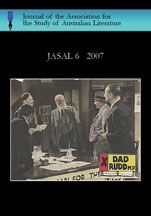The Mirror in The Magic Pudding
Keywords:
Norman Lindsay, magic pudding, anthemAbstract
This paper investigates Norman Lindsay’s 1918 illustrated children’s novel The Magic Pudding with a view to understanding how the text reflects the state of Australian wishfulness at a particular moment in the history of Australian literary consciousness and the national self-conception. In The Magic Pudding the distorting mirror shown the subject entering culture is one which hails (as it teaches) a characteristic cynicism with regard to the rules and rights of possession – a cynicism befitting the un-nameable anywhere of the action. This essay argues that the puddin’ as possession (slave and cannibal commodity) has provided an apt palimpsest for wishful thinking of the Australian kind, likewise for Australian styles of cynicism with regard to such wishfulness.Downloads
Issue
Section
Articles
License
The copyright for articles in this journal is retained by the author(s), with first publication rights granted to the journal. By virtue of their appearance in this open access journal, articles are free to use with proper attribution in educational and other non-commercial sectors.Attribution-NonCommercial-ShareAlike 2.1 Australia
This work is licensed under the Creative Commons Attribution-NonCommercial-ShareAlike 2.1 Australia License. To view a copy of this license, visit http://creativecommons.org/licenses/by-nc-sa/2.1/au/ or send a letter to Creative Commons, 543 Howard Street, 5th Floor, San Francisco, California, 94105, USA.
How to Cite
The Mirror in The Magic Pudding. (2007). Journal of the Association for the Study of Australian Literature, 6, 65-78. https://openjournals.library.sydney.edu.au/JASAL/article/view/10225

